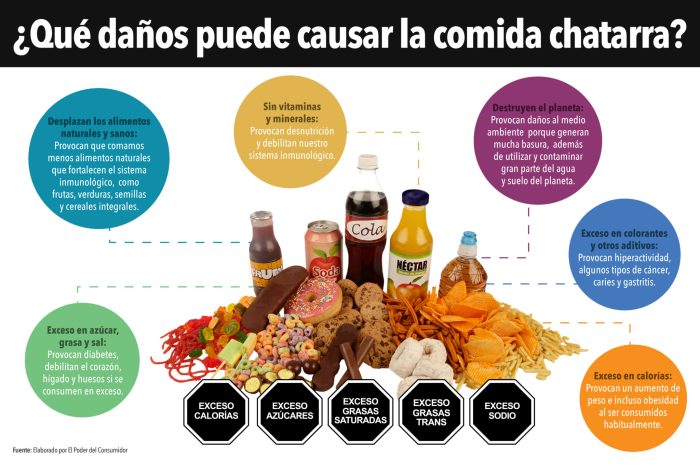Prepare to put your nutrition knowledge to the test with our engaging repaso de comida y salud quiz! Join us on an interactive journey where we explore the fascinating connection between food and health. From the impact of diet on physical and mental well-being to the role of nutrition in disease prevention and management, this quiz will challenge your understanding and leave you craving for more.
As you navigate through each question, you’ll not only test your knowledge but also gain valuable insights into the importance of healthy eating and making informed choices about the food you consume. Get ready to embark on a delicious adventure that will nourish your mind and body!
Overview of Food and Health
Food is essential for sustaining life and maintaining optimal health. The nutrients we consume from food play a crucial role in our physical and mental well-being. Understanding the connection between food and health empowers us to make informed choices that support our overall health goals.
Food provides the building blocks for our bodies, supplying essential nutrients like carbohydrates, proteins, fats, vitamins, and minerals. These nutrients are utilized for energy production, tissue repair, hormone synthesis, and various other bodily functions. A balanced diet that meets our nutritional needs is fundamental for optimal physical health, reducing the risk of chronic diseases such as heart disease, stroke, type 2 diabetes, and certain types of cancer.
Food and Mental Health
Emerging research highlights the significant impact of food on mental health. Certain nutrients, such as omega-3 fatty acids, have been linked to improved brain function and reduced risk of depression. A diet rich in fruits, vegetables, and whole grains has been associated with better mood and cognitive performance.
Conversely, a diet high in processed foods, sugary drinks, and unhealthy fats can contribute to inflammation and oxidative stress, which have been implicated in mental health disorders.
Dietary Guidelines and Recommendations

Navigating the vast world of nutrition can be daunting, but dietary guidelines and recommendations serve as a compass to help us make informed choices about what we eat. These guidelines are developed by experts in the field of nutrition and are based on extensive research and scientific evidence.
Adhering to these guidelines is crucial for maintaining good health and preventing chronic diseases such as heart disease, stroke, type 2 diabetes, and certain types of cancer. They provide a framework for a balanced and nutritious diet that meets our body’s nutritional needs while promoting overall well-being.
Food Groups and Macronutrients
Dietary guidelines emphasize the importance of consuming a variety of foods from all food groups. Each food group provides a unique set of nutrients that are essential for optimal health. These food groups include fruits, vegetables, whole grains, lean protein, and healthy fats.
In addition to food groups, macronutrients play a vital role in a balanced diet. Macronutrients are the three main types of nutrients that provide energy and building blocks for the body: carbohydrates, proteins, and fats. Each macronutrient has a specific function and is required in different amounts depending on individual needs and activity levels.
Nutrition Assessment and Monitoring: Repaso De Comida Y Salud Quiz

To ensure optimal health, it is crucial to assess and monitor nutritional status regularly. This process helps identify potential deficiencies or excesses in nutrient intake, guiding personalized dietary recommendations.
Methods for Assessing Nutritional Status, Repaso de comida y salud quiz
- Anthropometric Measurements:These involve measuring physical parameters like height, weight, body mass index (BMI), and waist circumference to assess overall body composition and identify potential malnutrition or overweight/obesity.
- Biochemical Tests:Blood tests can analyze nutrient levels, such as vitamins, minerals, and electrolytes, providing insights into the body’s nutritional status and potential deficiencies.
- Dietary Assessment:Food diaries, food frequency questionnaires, and 24-hour recalls help track food intake and identify dietary patterns, nutrient adequacy, and areas for improvement.
- Physical Examination:A healthcare professional can assess signs of nutritional deficiencies or excesses through physical examination, such as skin changes, hair loss, or muscle weakness.
Role of Food Diaries and Other Tracking Tools
Food diaries and tracking tools are invaluable for monitoring dietary intake and identifying areas for improvement. They provide a detailed record of food consumption, allowing individuals to:
- Identify patterns and trends in their eating habits.
- Monitor nutrient intake and identify potential deficiencies or excesses.
- Evaluate the effectiveness of dietary changes.
- Stay accountable and motivated in their dietary goals.
Importance of Monitoring Progress and Making Adjustments
Regular monitoring of nutritional status is essential to track progress and make necessary adjustments to dietary recommendations. This process involves:
- Setting Realistic Goals:Establishing achievable dietary goals that align with individual needs and preferences.
- Tracking Progress:Using food diaries, weight measurements, or other tracking methods to monitor adherence to dietary recommendations and progress towards goals.
- Making Adjustments:Based on monitoring results, healthcare professionals and individuals can collaboratively adjust dietary recommendations to optimize nutritional status and support overall health.
Dietary Interventions and Counseling

Dietary interventions are an essential component of managing various health conditions and promoting overall well-being. They involve modifying an individual’s dietary habits to achieve specific health goals, such as weight loss, blood sugar control, or reducing the risk of chronic diseases.
Types of Dietary Interventions
There are several types of dietary interventions, each tailored to specific health needs and goals. These include:
- Medical Nutrition Therapy (MNT):Prescribed and supervised by registered dietitians, MNT is an individualized nutrition plan designed to address specific medical conditions, such as diabetes, heart disease, or kidney disease.
- Weight Management Programs:These programs focus on helping individuals lose weight and maintain a healthy weight through dietary modifications, exercise, and behavior change strategies.
- Dietary Supplementation:In some cases, dietary supplements may be recommended to provide additional nutrients that are lacking in the diet or to support specific health conditions.
- Food Sensitivity Elimination Diets:These diets eliminate certain foods or food groups that may trigger allergic or inflammatory reactions in some individuals.
Role of Healthcare Professionals
Registered dietitians (RDs) and other healthcare professionals play a crucial role in providing nutrition counseling and guidance for dietary interventions. RDs are licensed professionals with advanced training in nutrition and dietetics who can assess nutritional needs, develop personalized meal plans, and provide education on healthy eating habits.
Other healthcare professionals, such as physicians, nurses, and health educators, may also provide nutrition counseling as part of their patient care. They can screen for nutritional deficiencies, offer general dietary advice, and refer patients to RDs for more specialized nutrition support.
Examples of Effective Dietary Interventions
Dietary interventions have been shown to be effective in managing various health conditions, including:
- Weight Loss:Low-calorie diets, portion control, and increased physical activity have been found to be effective for weight loss and maintenance.
- Diabetes Management:Carbohydrate counting, glycemic index monitoring, and regular meal timing can help manage blood sugar levels in individuals with diabetes.
- Heart Health:A heart-healthy diet low in saturated fat, cholesterol, and sodium can reduce the risk of heart disease and stroke.
- Kidney Disease:A renal diet restricts protein, sodium, and potassium to support kidney function and prevent further damage.
Food Safety and Handling

Food safety is crucial for maintaining public health and preventing foodborne illnesses. It involves practices that prevent contamination and spoilage of food, ensuring its safety for consumption.Common foodborne illnesses include bacterial infections like Salmonella, E. coli, and Campylobacter, as well as viral infections like norovirus and rotavirus.
These illnesses can cause a range of symptoms, including nausea, vomiting, diarrhea, and abdominal pain. Proper food handling and storage are essential to prevent these illnesses.
The repaso de comida y salud quiz can be a great way to test your knowledge of food and health. But if you’re looking for a more in-depth look at the topic, I recommend checking out uncle tom’s cabin mark twain . This article provides a comprehensive overview of the subject, covering everything from the basics of nutrition to the latest research on diet and disease.
After reading it, you’ll be sure to have a better understanding of how food can impact your health.
Guidelines for Safe Food Handling and Storage
To ensure food safety, follow these guidelines:
- Wash hands thoroughly with soap and water before and after handling food.
- Clean and sanitize food preparation surfaces, utensils, and equipment regularly.
- Separate raw meat, poultry, and seafood from other foods to prevent cross-contamination.
- Cook food to the proper internal temperature to kill harmful bacteria.
- Store food at appropriate temperatures to prevent spoilage and bacterial growth.
- Discard any food that shows signs of spoilage, such as mold or an off odor.
By adhering to these guidelines, you can significantly reduce the risk of foodborne illnesses and protect your health.
Food Literacy and Education

Food literacy empowers individuals with the knowledge, skills, and confidence to make informed food choices that support their health and well-being. It encompasses understanding food production, preparation, and nutrition to navigate the complex food system effectively.
Promoting food literacy in the community requires a multi-pronged approach. One key strategy is nutrition education, which provides individuals with the knowledge and skills to make healthy dietary choices. Cooking classes empower people to prepare nutritious meals at home, fostering self-reliance and healthy eating habits.
Resources for Nutrition Education and Cooking Classes
- Academy of Nutrition and Dietetics:Offers evidence-based nutrition information, resources, and educational programs.
- American Heart Association:Provides cooking classes, recipes, and nutrition tips to promote heart health.
- Community colleges and adult education programs:Often offer cooking classes and nutrition workshops tailored to local needs.
- Local health departments and community organizations:May offer free or low-cost nutrition education programs and cooking classes.
General Inquiries
How often should I consult a registered dietitian?
It is recommended to consult a registered dietitian regularly, especially if you have specific dietary concerns or health conditions. They can provide personalized guidance and support to help you achieve your nutritional goals.
What are some common foodborne illnesses?
Common foodborne illnesses include salmonella, E. coli, and norovirus. These illnesses can cause symptoms such as nausea, vomiting, diarrhea, and abdominal pain.
How can I improve my food literacy?
To improve your food literacy, you can attend cooking classes, read nutrition labels, and explore different cuisines. Additionally, there are many online resources and educational programs available to help you learn more about nutrition and healthy eating.